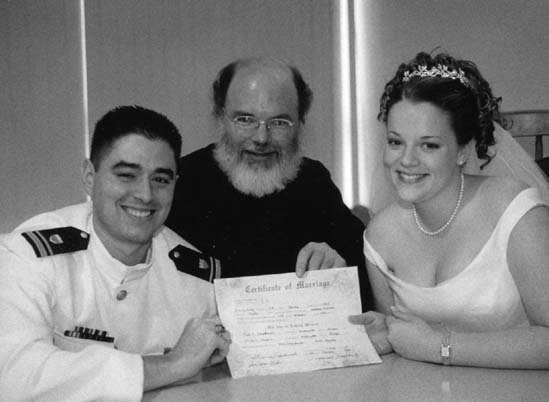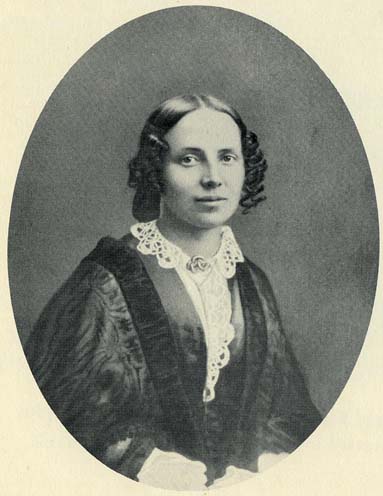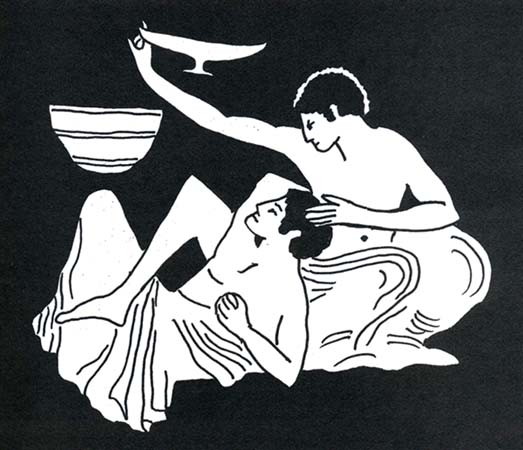|
Weddings
For Members If you are a
member of this congregation and want to be married in the church,
contact the Pastor to schedule
your wedding. At that time he will also discuss with you the policies
and procedures for your wedding in the church. For Non-Members If you are not
a member of this congregation and would like the Pastor to perform your
wedding ceremony for you somewhere other than in our church, call him at
206-935-6530 to discuss your plans. You may also email him at deogloria@foxinternet.com. But before you do that, be sure to read the
following wedding liturgy. It is what he would use at your wedding. So
make sure it is what you would like for your wedding before you give him
a call to discuss your plans. The Wedding Liturgy for Non-Members Invocation Pastor: In the
Name of God the Father, Son and Holy Spirit. Amen. Admonition Pastor: Dearly
beloved, because marriage is a holy estate instituted by God in his law,
whereby we learn that marriage is not to be entered into lightly but
instead held in the highest regard by all, let us humble ourselves
before our Lord and God in prayer, asking his blessing on this marriage
in the name of his dear Son, Jesus Christ. Prayer Pastor: Let us
pray: Eternal God, our creator and redeemer, as you blessed the wedding
at Cana in First Biblical A good wife…
is far more precious than jewels. She does her husband good and no harm
all her days. She… works with willing hands. She is like the ships of
the merchant, she brings her food from afar. She rises while it is yet
night and provides food for her household and tasks for her servants.
She considers a field and buys it;… she plants a vineyard. She…
makes her arms strong. She perceives that her merchandise is
profitable…. She opens her hand to the poor, and reaches out… to the
needy. She is not afraid of snow for her household, for all her
household are clothed in scarlet. She makes herself coverings… in fine
linen and purple. Her husband is known in the gates, when he sits among
the elders of the land. She makes linen garments and sells them….
Strength and dignity are her clothing, and she laughs at the time to
come. She opens her mouth with wisdom, and the teaching of kindness is
on her tongue. She … does not eat the bread of idleness. Her children
rise up and call her blessed; her husband also, and he praises her:
“Many women have done excellently, but you surpass them all.” Charm
is deceitful, and beauty is vain, but a woman who fears the Lord is to
be praised. Second Biblical Third Biblical Jesus said,
“God who made man from the beginning made them male and female, and
said, ‘For this reason a man shall leave his father and mother and be
joined to his wife, and the two shall become one flesh.’ So they are
no longer two but one flesh. What therefore God has joined together, let
not man tear apart.” And the Pharisees said to him, “Why then did
Moses allow for divorce?” And Jesus answered, “For your hardness
of heart Moses allowed for divorce, but from the beginning it was not
so. And I say to you: whoever divorces… except for unchastity and
adultery, and marries another, commits adultery.” The disciples of
Jesus said to him, “If such is the case, then it isn’t wise to
marry.” But Jesus said, “Not all men can receive this teaching, but
only those to whom it is given…. He who is able to receive this, let
him receive it.” A Sermon on Christian Marriage:
Martin Luther (1483-1546). “O what a
truly noble, important, and blessed condition the estate of marriage is
if it is properly regarded! O what a truly pitiable, horrible, and
dangerous condition it is if it is not properly regarded!…. False
love is that which seeks its own, as a man loves money, possessions,
honor, and women taken outside of marriage and against God’s command.
Natural love is that between father and child, brother and sister,
friend and relative, and similar relationships. But over and above all
these is married love, that is, a bride’s love, which glows like a
fire and desires nothing but the husband…. All other kinds of love
seek something other than the loved one: this kind wants only to have
the beloved’s own self completely. If Adam had not fallen, the love of
bride and groom would have been the loveliest thing. Now this love is
not pure either, for admittedly a married partner desires to have the
other, yet each seeks to satisfy his desire with the other, and it is
this desire which corrupts this kind of love. Therefore, the married
state is now no longer pure and free from sin. The temptation of the
flesh has become so strong and consuming that marriage may be likened to
a hospital for incurables which prevents inmates from falling into
graver sin” (1519) (LW 44:13-14, 8).
“Although in marriage there is… much trouble and unhappiness,
still one can enter into it with good will and at times have peace and
happiness. But outside marriage, where there is no grace, it is
impossible to have good will toward chastity and live happily in it….
Therefore the state of marriage is by nature of a kind to teach and
compel us to trust in God’s hand and grace, and in the same way it
forces us to believe. For we can see that where there is no faith in
marriage, there it is a most miserable institution, full of worry, fear,
and hard work…. For whatever is God’s work and business is so
arranged that it must practice and exercise faith. Where this is not
done, it becomes a burdensome and unbearable thing…. For faith makes
all things good, even death and all misfortune. Lack of faith makes all
things bad and destructive, even life and God himself…. Certainly in
the matrimonial order the body has its share of work, cares, and
troubles, just as the heart has its troubles with faith; yet nothing is
more certain than that all this is of God and pleases Him well…. Some
marry for money and property. Many people marry because of sheer
immaturity, to seek sensual pleasure and satisfy it. Some marry to beget
heirs. But… I know of… no reason… fundamentally stronger or
better [than], namely, need. Need commands it. Nature will express
itself, fructify, and multiply, and God does not want this outside
marriage, and so everyone because of this need must enter into marriage
if he wants to live with a good conscience and in favor with God”
(1523) (LW 28:28, 18, 19, 27). Betrothal Pastor:
[Groom’s name], will you have this woman to be your wife, to live
together after God’s law in the holy estate of matrimony? Will you
love her, comfort her, honor and keep her in sickness and in health,
and, forsaking all others, keep her only, so long as you both shall
live? Groom: I will,
and I ask God to help and guide me. Pastor:
[Bride’s name], will you have this man to be your husband, to live
together after God’s law in the holy estate of matrimony? Will you
love him, comfort him, honor and keep him in sickness and in health,
and, forsaking all others, keep him only, so long as you both shall
live? Bride: I will,
and I ask God to help and guide me.
Vows Groom: I
[groom’s name], take you, [bride’s name] to be my wife, to have and
to hold from this day forward, for better or worse, for richer or
poorer, in sickness and in health, to love and to cherish, till death do
us part, according to God’s holy law; and therefore I pledge you my
faithfulness. Bride: I
[bride’s name], take you, [groom’s name] to be my husband, to have
and to hold from this day forward, for better or worse, for richer or
poorer, in sickness and in health, to love and to cherish, till death do
us part, according to God’s holy law; and therefore I pledge you my
faithfulness. Exchange of Rings Groom: I give
you this ring as a sign of my love and faithfulness. Bride: I give
you this ring as a sign of my love and faithfulness. Pronouncement Pastor:
Because [groom’s name] and [bride’s name] have consented together in
holy matrimony, and have declared the same before Almighty God and in
the presence of this company, I pronounce them husband and wife: In the
name of God the Father, Son and
Holy Spirit. Amen. What God has joined together, let no one tear apart. Kiss Pastor:
[Groom’s name] and [bride’s name], you may kiss each other. Blessing Pastor: The
Lord God, who created our first parents and sanctified their union in
marriage, sanctify and bless you, that you may please God both in body
and mind, and live together in holy love until your life’s end. Amen. Prayer Pastor: Most
merciful God, who has joined this man and woman in the holy estate of
matrimony: Grant them grace to keep their marriage in line with your
holy Word; may their love for each other blossom; sustain and defend
them in their trials; and when tempted to stray from your ways, hold
them fast; through Jesus Christ, your Son, our Lord. Amen. Our Father Pastor: Our
Father who art in heaven, hallowed be thy name, thy kingdom come, thy
will be done, on earth as it is in heaven. Give us this day our daily
bread; and forgive us our trespasses, as we forgive those who trespass
against us; and lead us not into temptation, but deliver us from evil.
For thine is the kingdom, and the power, and the glory, forever and
ever. Amen. Benediction Pastor: May
God Almighty bless you and grant you length of days, wise and faithful
children, growth in life and faith. May God fill you with good things in
this world, and make you worthy of the joys reserved for the life to
come, through the grace of our Lord Jesus Christ, the Son of God. Amen
|






